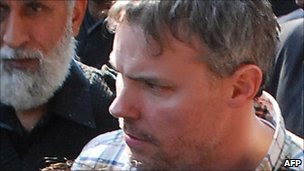Raymond Davis (file photo) CIA contractor Raymond Davis has reportedly already left prison
Continue reading the main story
Related Stories
* Lahore shootings fuel US-Pakistan row
* Behind the scenes of Pakistan's 'spy' shootings
* Raymond Davis and Lahore shootings - unanswered questions
A Pakistani court has freed a US CIA contractor after acquitting him of two counts of murder at a hearing held at a prison in Lahore, officials say.
Raymond Davis, 36, was alleged to have shot dead two men in the eastern city of Lahore in January following what he said was an attempted armed robbery.
The acquittal came when relatives of the dead men pardoned him in court.
They confirmed to the judge overseeing the case that they had received compensation - known as "blood money".
Under Pakistani Sharia law, relatives of a murder victim can pardon the killer.
Reports say about 18 family members of the two dead men were in court on Wednesday and confirmed that they wanted Mr Davis to be freed and pardoned because they had received "blood money".
The Pakistani media has reported that the families received 200 million rupees ($2.34m, £1.1m) but US Secretary of State Hillary Clinton denied the US government had paid any blood money.
Protests against the acquittal took place in Karachi, Lahore and Islamabad. In Lahore demonstrators clashed with riot police near the US consulate.
Six people were injured and several others were arrested after police baton-charged the crowd.
In other parts of Karachi, Lahore and Islamabad demonstrators set tyres on fire and disrupted traffic.
Cameron Munter, the US ambassador to Pakistan, said that he was "grateful for the generosity" of the families.
"I wish to express, once again, my regret for the incident and my sorrow at the suffering it caused," he said.
Mr Munter said that the US Department of Justice has opened an investigation into the incident.
Washington has always insisted that Mr Davis had diplomatic immunity and was acting in self-defence.
Faizan Haider, a lawyer representing the family of one of those killed, told the BBC that the "blood money" deal was done without his knowledge and that he was in detention when it was made.
Continue reading the main story
Analysis
M Ilyas Khan BBC News, Islamabad
It was high drama. For nearly seven weeks the media and the religious right in Pakistan waited for the indictment of Raymond Davis.
On Wednesday, they waited four hours for a session that normally would not last an hour. And then there was a burst of protests, not so much on the streets, but on the Pakistani TV channels.
The Raymond Davis affair touched a deep chord with the anti-US section of the Pakistani population and provided more fuel to an increasingly assertive religious right which organised demonstrations demanding that Mr Davis be hanged.
The issue also brought the US-Pakistan relations to their lowest point in recent years. Many thought that Mr Davis would be finally freed, but nobody expected this to happen so suddenly.
This is because nobody expected the families of the men Mr Davis killed to go for a blood money deal, an option which they had been rejecting apparently due to pressure from religious groups.
Although protests have now taken place, the religious lobby was initially unusually quiet on the issue. The fact that Mr Davis' release came under a clear Islamic law may be a reason.
"I was not allowed to participate in the proceedings of the case... and could not see or approach my clients," Asad Manzoor Butt said.
"I and my associate were kept under forced detention for four hours.
"If my clients have indeed signed a blood money deal, then this has been done behind my back and I don't know anything about it."
As recently as three days ago, relatives told the BBC they wanted justice not compensation.
Aijaz Ahmad, a cousin of Faizan Haider, said that eight members of his immediate family have not been traceable since news of the deal emerged.
"There is a padlock on their door. Their phones are all switched off. If they have done this then they have acted dishonourably," he said.
The immediate family of the other man killed is also reported to have gone missing.
Illegal weapons
The BBC's Orla Guerin in Islamabad said that Mr Davis - a former US special forces member - had already been released from jail but his exact whereabouts were unknown.
Protesters take to the street on Wednesday against the court decision The acquittal prompted protesters to take to the streets on Wednesday
She added that there were unconfirmed reports that he had already left Pakistan.
The deal to release him - made by the court sitting in his Lahore jail - ends a long-simmering diplomatic stand-off between Pakistan and the United States which had severely strained relations. It will come as a relief to both governments.
"The court first indicted him but the families later told court that they have accepted the blood money and they have pardoned him," Punjab Law Minister Rana Sanaullah told Reuters.
"The court acquitted him in the murder case."
Ms Sanaullah said that because Mr Davis was already on bail in a parallel case relating to possession of illegal weapons at the time of the killings, there was no reason why he should not also be released in that case too.
Mr Davis was arrested immediately after he shot dead two men. He has said that he killed them in self-defence as they were trying to rob him.
A third man was run over by a US vehicle that came to the American's aid but there have so far been no charges in relation to that case.
Public anger intensified after unnamed US officials said that Mr Davis had been secretly working for the CIA at the time and questions are likely to remain as to what he was exactly doing at the time.
The BBC's M Ilyas Khan in Islamabad says it is not clear exactly how much blood money was paid to the families of the dead men.
Our correspondent, who visited the families recently in Lahore, says they had been under great pressure from right-wing religious parties not to accept "blood money".
Hardline religious parties have led protests across Pakistan against Mr Davis in recent weeks and were keen to see him punished.
The Jamaat-e-Islami has announced that demonstrations will be held in protest against the release on Thursday.




 01:01
01:01
 wasooo
wasooo

























